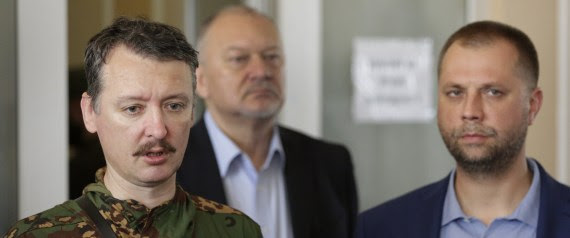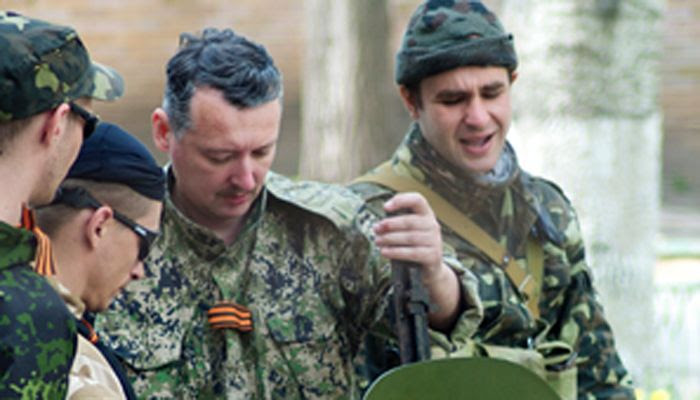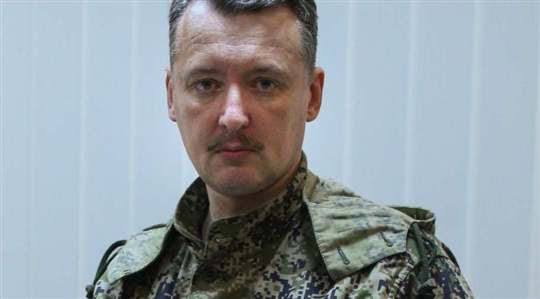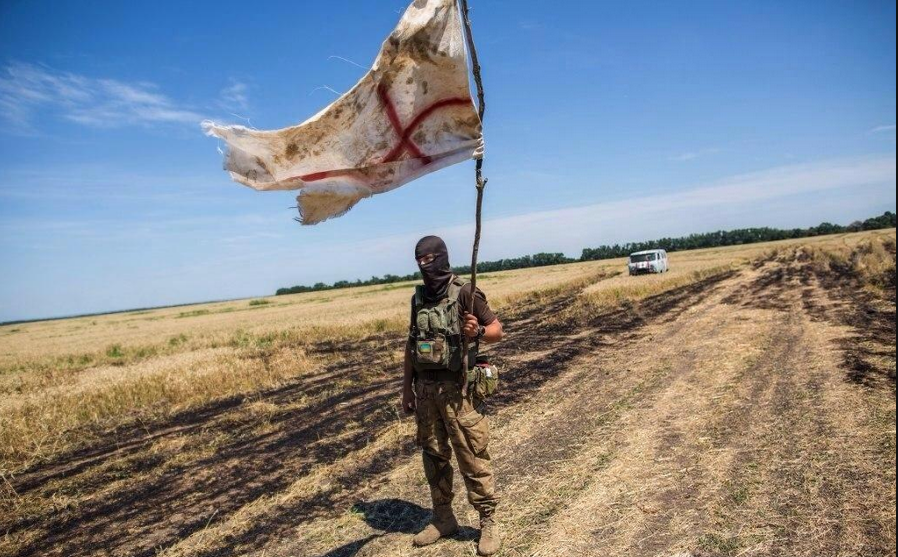Original: El Murid LiveJournal (Anatoliy Nesmeyanov)Translated from Russian by Gleb Bazov / Edited by @GBabeuf
 Over the course of my stay in Donetsk I saw nothing that was markedly different from what is publicly known. Up close, however, many things certainly appeared completely different in detail.
Over the course of my stay in Donetsk I saw nothing that was markedly different from what is publicly known. Up close, however, many things certainly appeared completely different in detail.
When the Slavyansk Brigade came to Donetsk, almost immediately the question of cooperation among the units gathered in the city was raised. Two paths were evident: the creation of a centralized hierarchical command, or the establishment of a kind of ‘Shura’—a council of commanders. The first option was fraught with the danger of a civil war within a civil war; the second one immediately made the process of creating an army a long-term affair.
 The commanders chose the second path, especially since I did not observe any of them to have any particular disagreements with Strelkov. The question of the Vostok Battalion and Khodakovskiy was treated separately, although, as I understand it, a solution to this issue was also found.
The commanders chose the second path, especially since I did not observe any of them to have any particular disagreements with Strelkov. The question of the Vostok Battalion and Khodakovskiy was treated separately, although, as I understand it, a solution to this issue was also found.
At this moment in time, the Militia of Donetsk is comprised of three large brigades: the Slavyansk Brigade and the Oplot and Vostok Battalions. Apart from these, there are several self-sufficient militarized structures, such as police units. Among them all there is complete coordination and cooperation. The representatives of the Vostok Battalion categorically abstain from attending joint meetings; however, in spite of this, Strelkov has a mechanism for coordinating actions even with them—right in front of me, literally five minutes after getting disinformation concerning an attack on Yasinovataya by ten tanks [of the Ukrainian Army], Strelkov received information from Vostok that there were not ten, but three tanks, and, even so, that one of them was burned out, while the rest had retreated. Apart from the Donetsk military formations, there is an almost entirely self-sufficient unit commanded by Bezler; however, here also there are no problems of cooperation or coordination.
 The system works quite effectively, even though certain problems naturally do exist. The independence of the Oplot and Vostok Battalions is due, first and foremost, to their independent supply channels. These units are practically independent from Strelkov also in this aspect; however, even in this regard, when the need arises, they manœuvre [and share] their available resources in the interest of their common struggle—all without any problems. Overall, the process of building the DPR [Donetsk People’s Republic] Army is following a path that is fairly traditional in similar situations. It can be said that, at this stage, the most operationally capable management structure has been found.
The system works quite effectively, even though certain problems naturally do exist. The independence of the Oplot and Vostok Battalions is due, first and foremost, to their independent supply channels. These units are practically independent from Strelkov also in this aspect; however, even in this regard, when the need arises, they manœuvre [and share] their available resources in the interest of their common struggle—all without any problems. Overall, the process of building the DPR [Donetsk People’s Republic] Army is following a path that is fairly traditional in similar situations. It can be said that, at this stage, the most operationally capable management structure has been found.
Nonetheless, this structure has its weak link. The council of commanders recognizes Strelkov as their Commander-in-Chief; moreover, I noticed that this acceptance is unconditional. Although he is merely a first among equals, his role in the organization is extraordinarily important. And that is why the persistent efforts of the Moscow Nazis [Note: reference to Kurginyan and his sectarians, whose media attacks on Strelkov benefit the Ukrainian Junta] appear exceedingly dangerous from all points of view. In view of the chosen organizational form of command, there is no one else that the commanders will agree to subordinate to.
 It may well be that the well-known political analyst [Note: Kurginyan] and his pro-Nazi sect nourish the hope that, by removing Strelkov and installing at the head of the Militia a commander controlled by them, following victory they will gain the right to construct a simulacrum of themselves in Novorossiya. The problem is that there is no visible path to victory in such a scenario—the Militia will never subordinate itself to anyone else. The breakdown of the control structure would be inevitable, and then, in order to restore at least some control, war would have to be waged between former allies. In this case, the result of such infighting looks quite problematic for the Moscow Nazis—it is the Slavyansk Brigade that is the most powerful force in the Militia. Nevertheless, all of this still does not change the fact that [Kurginyan’s] sect operates strictly in the interests of Kiev.
It may well be that the well-known political analyst [Note: Kurginyan] and his pro-Nazi sect nourish the hope that, by removing Strelkov and installing at the head of the Militia a commander controlled by them, following victory they will gain the right to construct a simulacrum of themselves in Novorossiya. The problem is that there is no visible path to victory in such a scenario—the Militia will never subordinate itself to anyone else. The breakdown of the control structure would be inevitable, and then, in order to restore at least some control, war would have to be waged between former allies. In this case, the result of such infighting looks quite problematic for the Moscow Nazis—it is the Slavyansk Brigade that is the most powerful force in the Militia. Nevertheless, all of this still does not change the fact that [Kurginyan’s] sect operates strictly in the interests of Kiev.
More likely than not, the Moscow oligarchs that sent the fulminating political analyst to Donetsk see the situation in the correct light and hope, by removing Strelkov, finally to bury the idea of Novorossiya—followed by a coup in Moscow. It is difficult to tell whether the ‘Guru of Treason’ understands this. It may be that he is being used without his knowledge [Gleb: Yes, and my right foot is green, while the left one changes colour daily…].
One way or another—but any attempts to create problems for the Militia by undermining the current command structure will at this stage lead to a defeat. Essentially, this is the main thing that I finally was convinced of in Donetsk.
 It is true that an army built on the basis of oral agreements is not, strictly speaking, an army. And the need to establish a fully-fledged command structure, which is not dependent on the identity of the Commmander-in-Chief, will inevitably arise. At this time, however, there are not the slightest prerequisites for this to happen. The value of the DPR’s political component today is at best zero, if not negative. The construction of a fully-fledged political and economic management system has, so far, been unsuccessful. The constant shuffling of premiers and deputy premiers is the best evidence of this fact. This structure is only beginning to be formed; appropriate candidates are being identified, base principles of the DPR’s political programme are being formulated.
It is true that an army built on the basis of oral agreements is not, strictly speaking, an army. And the need to establish a fully-fledged command structure, which is not dependent on the identity of the Commmander-in-Chief, will inevitably arise. At this time, however, there are not the slightest prerequisites for this to happen. The value of the DPR’s political component today is at best zero, if not negative. The construction of a fully-fledged political and economic management system has, so far, been unsuccessful. The constant shuffling of premiers and deputy premiers is the best evidence of this fact. This structure is only beginning to be formed; appropriate candidates are being identified, base principles of the DPR’s political programme are being formulated.
And that is precisely why even an army based on oral agreement is the only structure that provides the necessary stability to the DPR. Undermining this army by discrediting its Commander-in-Chief and the targeted attacks on him by corrupt politicians and their insane sectarians represent deliberate attempts to destroy the entire idea of the Donbass uprising. At this time, there is no other way to characterize or understand these assaults on Strelkov.
I say this not because I am acquainted with him or because I experience feelings of friendship for him—in this case, all such considerations are absolutely irrelevant. There is an entirely objective situation that dictates its own rules of engagement. Essentially, I returned to Moscow now, and not later, because the danger posed by these attacks is currently exceedingly high. Their intensity is increasing, and there are signs of this not only in the public domain. I did not come alone, and we will try to convey this message to the highest of offices and to the widest possible audience. At the moment, this is what is most important.
At the same time, the military prospects of the DPR at this time I would characterize as clearly ‘non-zero’ [Note: i.e. positive]. Kiev does not appear to have any strategy to suppress the uprising that would generate results in the short term. A war of attrition would be ruinous for Novorossiya—particularly in a context where Russian aid remains largely symbolic in nature and manifests itself primarily as humanitarian and private deliveries.
Even so, Kiev also does not have a wide berth for manœuvre in such a field—its situation appears no longer just critical, but catastrophic. The solution may become a coup and the establishment of an openly Nazi military dictatorship, which would then crush any and all unrest in the territory of Ukraine, enabling it to continue the war in the previous format even in the context of a complete collapse.
 Whether or not the Europeans would risk giving the go-ahead for the creation of such a state is a difficult question to answer. So far, Poroshenko’s regime, despite all its pro-Nazi orientation, still appears to the West to be fairly controllable. However, the creation of a Banderite ‘Caliphate’ in the middle of Europe could completely change the situation on the continent—just as the situation in the Middle East was transformed by the creation of the ISIS ‘Caliphate’, which completely unshackled itself from its creators.
Whether or not the Europeans would risk giving the go-ahead for the creation of such a state is a difficult question to answer. So far, Poroshenko’s regime, despite all its pro-Nazi orientation, still appears to the West to be fairly controllable. However, the creation of a Banderite ‘Caliphate’ in the middle of Europe could completely change the situation on the continent—just as the situation in the Middle East was transformed by the creation of the ISIS ‘Caliphate’, which completely unshackled itself from its creators.
At the same time, the United States may well go along with this course of events—it does not scare them in the least. And that is why the likelihood of a coup in Kiev and the coming to power of radicals is quite high.




Why does anybody take this clown Kurginyan seriously at all?
Oh that’s right, I guess there really is a 5th column in Moscow as Dugin and Fedorov have been ranting about for months. Must be if ITAR TASS will report Strelkov’s death at the drop of a hat when it turns out he’s very much alive. Somebody needs to get a talking to about that screw up, not for ideological reasons but because it’s bad journalism and makes ITAR TASS look like an unreliable collection of amateurs, which it is not. At times I think ‘who the hell are these people and how do they influence things the way they do?’ ‘How can the US get away with sending the Ambassador who presided over the Rose and Orange Revolutions and not have him immediately punked/persona non grata’d out of Spaso House?’
But then I realize there are forces pushing back all the time against decoupling Russia from the petrodollar/Empire globalist economic system. The NWO has their people in Moscow too and several Russian as well as Ukrainian oligarchs by the short ones. Kurginiyan is just the voice of his master Ahkmetov.
“Why does anybody take this clown Kurginyan seriously at all?”
I think it may be because of the facts. Kurginyan claims that he and Essence of Time had amply supplied Strelkov with arms and ammunition and thought Strelkov was just crying poor mouth to pressure the Kremlin.
If it is true that Strelkov abandoned Slavyansk while fully able to hold it, which the Military Commander of the DNR Zakharchenko wanted to do, it affects how we view the entire aftermath.
I, for one, believe it. Anyone who would choose a military judgement of Strelkov’s over Zakharchenko’s is guilty of a willing suspension of disbelief.
no comments ?
I guess I’m a day ahead…
This is a great analysis, especially Gleb’s notes…perfect….if a Nazi Caliphate arises in Europe, America won’t escape either….what a world that would be for the next centuries.
I don’t understand what the attraction is for all the young people who join this movement ? What is going on in our youth ? Could this be the result of years of “virtual violence” on the television and computer ? Along with the deteriorating education that was installed via ‘Skull and Bones’ in the 1830’s and on ?
I have heard that if you destroy history by wrecking all the standing stones…art and architecture… that humanity will lose its identity…
When already at Strelkov; there’s an easy way to debunk rumors on being killed or severely wounded:
Doberman: “I’m alive”
https://www.youtube.com/watch?v=rHE0LJXq2Xw
Re Ann @ 04:38 14 August 2014
Intelligence in the public domain is patchy but the motivations appear to be neither homogenous nor constant.
A significant component of the motivations of the opponents’ fighting strength appears to be class hatred.
Agression in myriad forms can afford momentary relief.
To the uninitated it may appear that complexity, doubt and volatility are disadvantages.
However these in interaction afford myriad opportunities to opponents for lateral strategies.
As to others who may be presently perceived as opponents, their motivations appear to be subject to the aspects outlined above with specific oscillations.
As to specifics in context, it is not a wise strategy to educate your opponents, wisdom generally lies in using their ignorance against them without appearing to do so.
Ann,
Maybe it’s time zones? I agree, this piece offers a fascinating window we on the sidelines don’t ordinarily get. Thank you soooo much, Gleb, for translating this; it’s a gem, and I’ll never forget your multicolored feet, either! ;~)
I think the skinhead phenomenon — that’s basically what this is, right? — is due in part to teevee and video game violence, but also a reaction to the essential emptiness of post-modern life. They see no glue holding together any of the institutions by which human society generally runs itself, and I’m not talking just family but neighborhood, church, school, community, government from local up to national: nothing seems to work right any more, much less be a part of a coherent whole. And they see no future for themselves and hey, let’s blame someone else, and focus all our inchoate rage on them. Not sure how Skull and Bones instilled deteriorating education in the 1830’s though: they were too busy getting filthy rich off the Opium Trade.
Anonymous 10:16,
I like your thinking. It really stretches me sometimes but I always get something out of it. Thank you. ;~)
Thanks for translating this, Gleb Bazov.
“[Gleb: Yes, and my right foot is green, while the left one changes colour daily…]”
I agree, Kurginyan has a long history as a 5th element saboteur.
Kurginyan: the Israel trail
http://translate.yandex.net/tr-url/ru-en.ru/voicesevas.ru/news/analytics/2671-kurginyan-izrailskiy-sled.html
His role is a useful window into the way Israel/zionist Jews operate in Russia now. Officially israel remains neutral, but covertly, they are a, if not the, major corrupting vector there for the ZPC/NWO.
вот так
Nora !
S & B’s were instrumental in the modern education in US (and Canada and everywhere now) its in a book by Anthony Sutton called by that name…maybe not so easy to get….
The original members of S & B were from Germany…masons….and they became the heads of the existing universities across Eastern Seaboard USA and from there installed the education programs in all the universities…1830’s did not have too many universities in the USA.
Isn’t hindsight grand! I’d enjoy seeing how El Murid spun the emerging reality, but not enough to search and Yandex.
I wonder if he has realized yet that Strelkov is a terribly unreliable source on the subject of Strelkov’s support. If he had anyone’s support besides Mozgovoi’s after leaving Slavyansk, it wasn’t for long. And how do you say “Doesn’t mean a thing” that the three top fighting men, Zakharchenko, Khodakovsky and Besler, are outside the tent?
When Strelkov, through Mozgovoi, was trying to reassemble these forces and reinstate his military dictatorship through a “Military Council,” Strelkov said he had the support of all the
field commanders of the LNR and the majority of the DNR. But on the day the Council was convened, nobody showed up.
And all the while he was planning and preparing this mutiny, Strelkov was simultaneously saying he had resigned as Defense Minister because dissension in the ranks was fatal to a fighting force, and that he was not returning to Donbass because if he did everyone would flock to him and this might split the resistance.